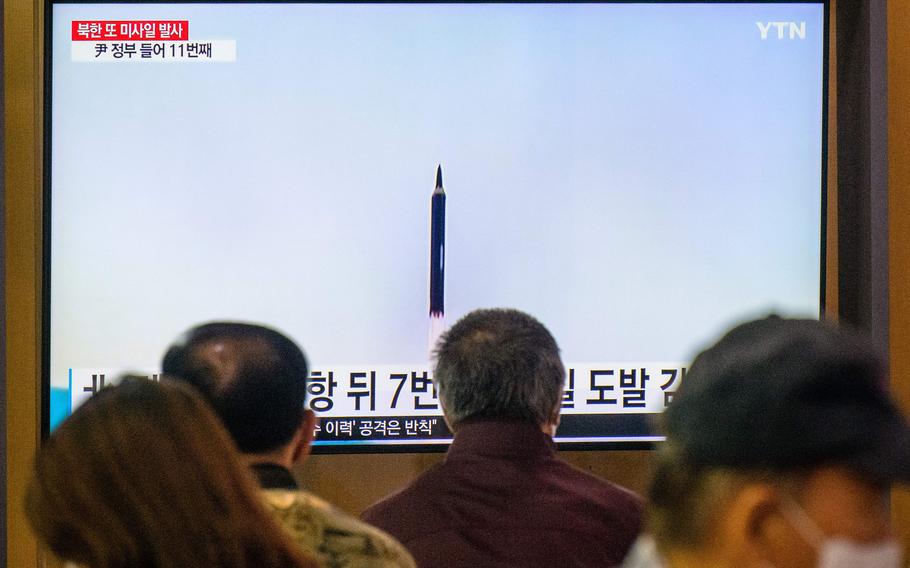
People sit near a television screen showing a news broadcast with file footage of a North Korean missile test, at a railway station in Seoul on Sunday, Oct. 9, 2022. (Anthony Wallace/AFP/Getty Images/TNS)
(Tribune News Service) — South Korea said its military will strengthen security cooperation with the U.S. and Japan, including the deployment of “U.S. strategic assets,” after Kim Jong Un’s North Korea fired two short-range ballistic missiles Sunday.
The provocations, in violation of United Nations Security Council’s resolutions, will strengthen sanctions against North Korea, worsen public welfare and make the regime “very unstable,” South Korea’s National Security Council said in a statement after an urgent meeting to brief President Yoon Suk Yeol. The missiles were launched from the Munchon area in Kangwon province between 1:48 a.m. and 1:58 a.m., the Joint Chiefs of Staff said in an email.
The missile tests add to 10 launched by North Korea over the past two weeks. The USS Ronald Reagan aircraft carrier group made a U-turn after one of those missiles flew over Japan. The group returned to waters off the Korean Peninsula and held missile defense exercises with naval forces from Japan and South Korea on Thursday.
The incidents hearken back to the autumn of 2017, when Kim’s regime unleashed its largest barrage of long-range rockets and detonated a nuclear bomb, prompting fresh U.N. sanctions.
The missiles launched Sunday flew about 350 kilometers (217 miles) and reached an altitude of 90 km (56 miles) at top speeds of Mach 5, according to the JCS statement. The South Korean and U.S. military forces will establish a heightened state of readiness, the statement quoted JCS Chairman General Kim Seung-kyum and General Paul LaCamera, commander of the South Korea-U.S. Combined Forces Command, as saying.
Pyongyang said on Monday that its tactical nuclear unit held training exercises from Sept. 25 to Oct. 9 to verify the country’s deterrence and counterattack capabilities, and to send a severe warning to its enemies.
The North Korean leader presided over the exercises and said that he didn’t see a need to hold talks in the face of military threats, according to the official news agency KCNA.
Kim’s regime on Saturday also criticized the presence of the carrier group as “extremely worrisome,” saying that its armed forces are taking a serious approach toward its deployment.
North Korea has bristled for decades at joint military exercises, calling them a prelude to an invasion. Its latest provocations have been the strongest reaction under Kim to the U.S. bringing nuclear assets into the region.
The carrier group had previously been in the same area in late September at around the time U.S. Vice President Kamala Harris visited Japan and South Korea. During her visit, which took her to the Demilitarized Zone that divides the two Koreas, Harris warned North Korea against raising tensions and called on Kim to return to stalled nuclear disarmament talks.
Unlike with previous launches, his regime has mostly refrained from trumpeting the missiles along with the usual creative vitriol directed at the U.S. and its allies. The North Korean leader himself has been out of the public eye for almost a month, his longest absence in a year.
North Korea on Monday has one of the biggest days on its political calendar when it celebrates the anniversary of the foundation of its ruling Workers’ Party. If Kim doesn’t show up at festivities, speculation is certain to mount about the health of the 38-year-old leader, who’s overweight and a heavy smoker.
The subdued posture suggests North Korea is intent on letting actions speak louder than words as it looks to build a credible nuclear threat. One of the main reasons is that Kim has more reliable partners in China and Russia, which supported sanctions against his regime at the U.N. only five years ago.
Further provocations may be coming with the U.S., Japan and South Korea saying Pyongyang could be ready to conduct its first nuclear test in five years — with the three pledging a stern and united response if there’s a blast.
The tensions will likely add to global anxiety over nuclear saber-rattling as Russian President Vladimir Putin alludes to his atomic arsenal while attempting to bolster his struggling invasion of Ukraine. The U.S.’s push to isolate Russia over the war — coupled with increasing tensions between Washington and Beijing — has allowed Kim to strengthen his nuclear deterrent without fear of new U.N. sanctions.
___
©2022 Bloomberg L.P.
Visit bloomberg.com.
Distributed by Tribune Content Agency, LLC.